EVENT
Event News
Talk on wireless networks
Outline
- Date:
- April 17th (Friday)
- Time:
- 11:00-12:00
- Place:
- Room 1901-1902, National Institute of Informatics
Access - Speaker:
-
Nicolò Michelusi
University of Southern California, Los Angeles, CA - Title:
- Cross-Layer Sensing, Estimation & Control in Wireless Networks exploiting Sparse Dynamics and Protocol Structure
- Abstract:
- As mobile and machine-to-machine traffic is expected to grow exponentially in the next decade, tools for the design and optimization of agile and heterogeneous wireless networks are of great interest.
Indeed, network design and operation have enormous complexity, due to the huge state space, the lack of global network state information at the decision units, the decentralized operation and resource constraints of wireless devices, thus requiring a holistic approach for network control and design. In the first part of the talk, I will present a principled framework for joint distributed sensing, estimation and control in wireless networks, which captures the interplay between state estimation and control and accounts for cross-layer factors such as the cost of acquisition of state information and the shared wireless channel. The framework will be applied to a spectrum sensing-scheduling application, where a network of secondary users (SUs) attempts to opportunistically access portions of the spectrum left unused by a licensed network of primary users (PUs). Adaptive spectrum sensing and scheduling schemes are jointly optimized so as to maximize the SU throughput, subject to constraints on the PU throughput degradation and the sensing-transmission cost incurred by the SUs. I will show how low-complexity can be achieved by exploiting the large network approximation, a two-stage decomposition of the dynamic programming algorithm, as well as sparsity of network dynamics enabling efficientstate estimation via sparse recovery techniques.
In the second part, I will present novel techniques for the SUs to improve the spectral efficiency by exploiting the temporal redundancy introduced by the retransmission protocol employed by the PUs: by decoding the data packet transmitted by a PU in some slot, the SUs can remove its interference over the entire retransmission window of the PU, thus creating a “clean” channel for secondary data transmission. Furthermore, I will present a chain decoding protocol (CDP), which allows the SUs to perform opportunistic retransmissions, so as to create a favorable interference pattern for secondary data transmission. The CDP, initiated by a successful decoding operation of a SU or PU packet, consists in the iterative application of interference cancellation, as previously corrupted packets become decodable. Based on this scheme, I will design an optimal policy that dictates what (SU retransmission policy) and when (SU access policy) to transmit in order to maximize the SU throughput under a constraint on the performance degradation incurred to the PUs. This joint design leads to huge optimization complexity. By exploiting a graph representation of the CDP, I will prove the optimality of the following decoupling principle enabling low-complexity design: what to transmit is based on five basic chain decoding rules; when to transmit is determined as the solution of a Markov decision process on a compact state space representation, enabling efficient numerical optimization. - Bio:
- Dr. Nicolo Michelusi received the B.Sc. degree with honors, M.Sc. degree with honors and Ph.D. degree in Electrical Engineering from University of Padova, Italy, in 2006 and 2009, and 2013 respectively. Additionally, he received a second M.Sc. degree in Telecommunication Engineering from Technical University of Denmark in 2009, under the T.I.M.E. double degree program (www.time-association.org). In 2011, he was a visiting research scholar at University of Southern California in Urbashi Mitra's group and in Fall 2012, he was a visiting research scholar at Aalborg University, Denmark, where he worked with Prof. Petar Popovski. He is currently a postdoctoral research fellow at the Ming Hsieh Department of Electrical Engineering, University of Southern California, USA, working with Prof. Urbashi Mitra. His research interests are in the areas of wireless communications, cognitive networks, energy harvesting, distributed estimation and adaptive control for wireless networks, modeling and design of bacterial systems. He is the recipient of a scholarship from the Fondazione Ing. Aldo Gini (2010) and he was awarded the Toni Mian scholarship for the best Master's Thesis in Information Engineering from University of Padova, Italy in March 2010. In 2013, he was awarded the grant “Isabella Sassi Bonadonna” from AEIT (Italian association of electrical engineering).
Contact
Gene Cheung
E-mail: cheung[at]nii.ac.jp
*Please replace [at] with @.

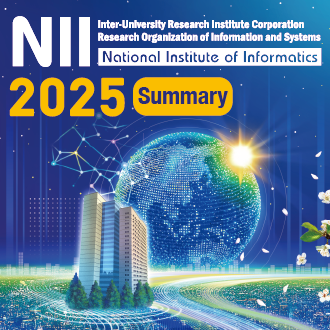 Summary of NII 2024
Summary of NII 2024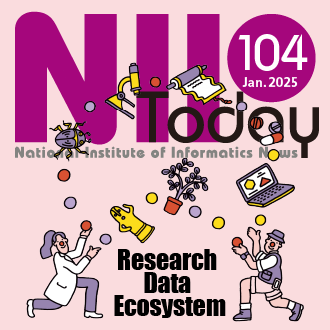 NII Today No.104(EN)
NII Today No.104(EN)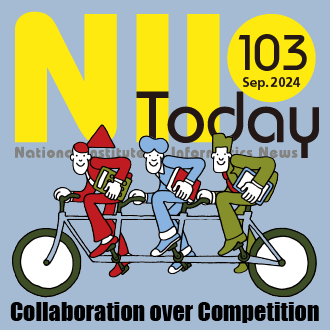 NII Today No.103(EN)
NII Today No.103(EN)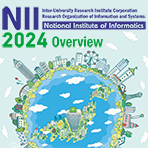 Overview of NII 2024
Overview of NII 2024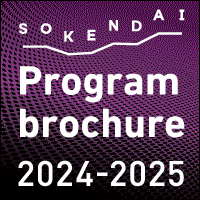 Guidance of Informatics Program, SOKENDAI 24-25
Guidance of Informatics Program, SOKENDAI 24-25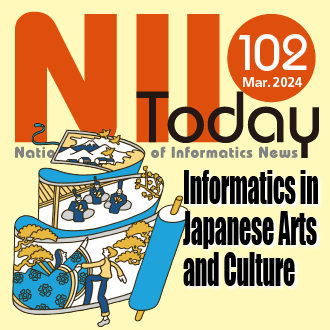 NII Today No.102(EN)
NII Today No.102(EN) SINETStream Use Case: Mobile Animal Laboratory [Bio-Innovation Research Center, Tokushima Univ.]
SINETStream Use Case: Mobile Animal Laboratory [Bio-Innovation Research Center, Tokushima Univ.] The National Institute of Information Basic Principles of Respect for LGBTQ
The National Institute of Information Basic Principles of Respect for LGBTQ DAAD
DAAD
